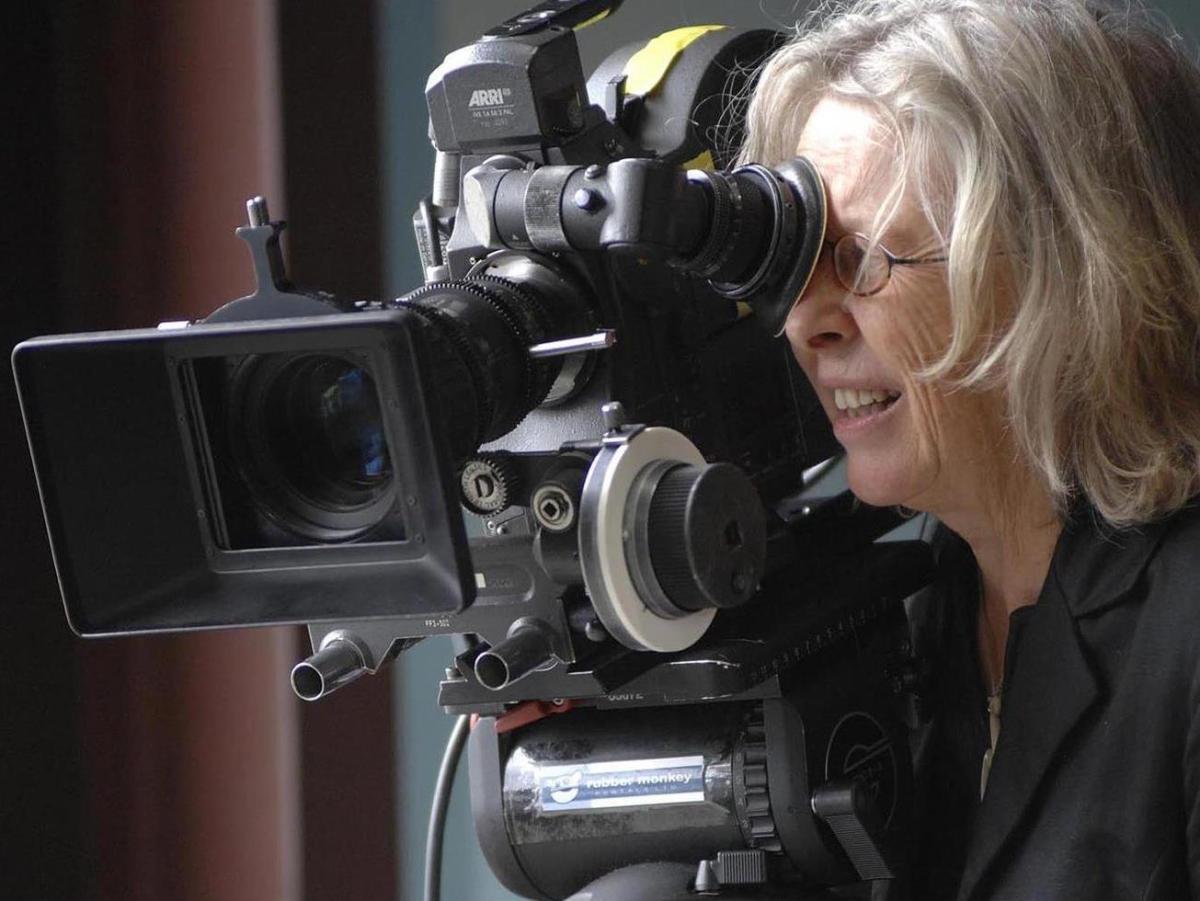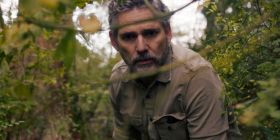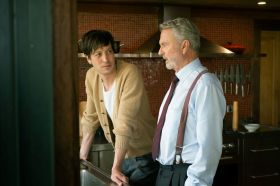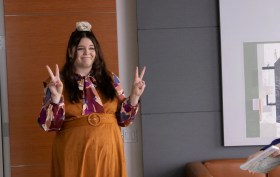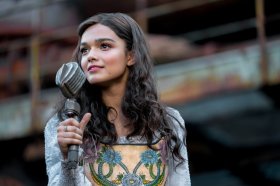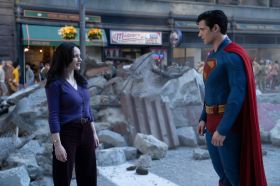NZ filmmaker Dame Gaylene Preston at work and flourishing in her 70s. Image supplied.
Have you ever lied about your age, or had second thoughts about publicly celebrating your 40th or 50th birthday? It’s not just vanity, you’re worried about how your age may affect your future employment prospects, and rightly so. According to the Australian Human Rights Commission (AHRC), a recent survey on attitudes to employing older workers conducted by the Australian Human Resources Institute (AHRI) has found that ‘up to 30 per cent of Australian employers are still reluctant to hire workers over a certain age, and for more than two thirds of this group, that age was over 50.’
It’s difficult to pinpoint exactly how such attitudes work within the Australian screen industry, but our guess is that ageism is rife, it’s complicated and it’s going to be difficult to address. Yet we need more conversations about this issue and how it fits within the larger diversity and inclusion agenda, where sexier and more visible diversities provide better copy and more colourful photo opportunities. (Don’t even try to find a non-depressing stock image to represent ‘ageing in the workplace’!)
Australia’s Screen Diversity and Inclusion Network (SDIN) began as an initiative of AFTRS under Neil Peplow in 2017 as a response to a Screen Australia report that showed that the overwhelming ‘whiteness’ of Australian TV drama compared to the reality of our population. But the charter of the organisation is far broader, encompassing all the diversity categories. The signing members include all the broadcasters, state and national screen agencies, guilds as well as MediaRING, FreeTV and AFTRS. These organisations have all committed in principle to ‘providing equal opportunities for all people at all levels, irrespective of their gender, age, race, sexual orientation, nationality, religion, disability or geographic location.’
Important aspirations, for sure, but difficult to monitor or address in reality, especially when it comes to age.
When French filmmaker Agnès Varda died earlier this year at the age of 90, the world marked her passing with bouquets of admiration. Not only was Varda known as the grandmother of the mostly macho French New Wave, she’d kept on making uniquely personal crowd-pleasing documentaries, traveling the global film festival circuit, right up until the end of her life. Varda was a beacon of hope, not only for women working in film, but for all older people in the arts aspiring to a continuing creative professional life after 50, 60, 70 or even 80.
It hardly needs saying that Varda is the exception rather than the rule in the screen industry, which has always been skewed towards youth – both in front of the camera and behind it. It’s a problem for both men and women, but for women, already disadvantaged and grossly underrepresented, it’s especially obvious. As Briony Kidd, board member of Women in Film and Television Australia (WIFT) said to us in an email, ‘Women already deal with gender bias, have longer routes to get into the industry and disproportionately take time out of their careers to care for family. These factors ensure that ageism delivers a particularly nasty sting to female practitioners.’
Stories from the frontline
This article originated from an anecdote in a closed Facebook forum for women working in Australian TV. One member in her mid-40s, an actress transitioning to writing and producing after doing a Masters at AFTRS, told the story of being put forward by a producer for an attachment. This opportunity was then withdrawn when the key funding agency realised her age and extensive onscreen credit list, saying that at her ‘stage in life it wouldn’t be meaningful employment.’ She doesn’t want her name included here, or that of the agency, as she fears it may affect future opportunities. The experience was especially galling for this woman, as one of the reasons she was trying to extend her skill set was the fact that as an actress (you would have seen her in many a TV drama), after she turned 40, ‘it was crickets’.
This reluctance to go on the record about ageism was a common response to requests for comment, especially if those asked considered themselves ‘emerging’ or not yet established.
That original Facebook post prompted a chain of comments by women who had also experienced what they thought was discrimination or prejudice due to age and stage of life. A number of commenters said they regularly lied about their age, or compressed their long credit lists into the last ten years. Others complained that they were excluded from programs for ‘emerging creatives’ because they were deemed ‘too experienced’ despite having few or no screen credits in the areas they were applying.
We asked Screen Australia to comment on how age might affect opportunities for those applying for funding or attachments, and they said: ‘We don’t ask people’s age in applications so it’s not a factor in any of our funding decisions.’
Screen Australia did offer the following information about their inclusive attachment scheme, which applies to Feature Drama, General Drama, Children’s programs, Online Production, Documentary Commissioned, and Indigenous TV & Features, but not to PEP funding or the Documentary Producer Program:
It is a condition of Screen Australia production support [that] an above or below the line attachment must be allocated to each project: for example an attachment to a Director, Producer, DOP, Editor or Composer. The attachment should reflect the theme or content of the project: for example Indigenous, disability, gender, LGBTI+, culturally or linguistically diverse. Or the attachment should be targeted at providing experience to emerging practitioners. The costs must be included within the production budget and potential attachments should be discussed with the Investment Manager. The attachments are coordinated by the production team in consultation with Screen Australia. The rate is equity minimum depending on the role.
It’s easy to see how ageism might be overlooked, masked or denied in a subjective process that’s trying to right so many wrongs, and when there are so many applicants for so few jobs. This isn’t a call-out on Screen Australia’s policy, merely an observation on how tricky it is. And we do note the fact that the above statement says nothing about age in its examples of diversity.
Breaking in is harder when you’re older
The problems of ageism seem especially acute for those people in midlife who are trying to break into new areas of the screen industry, and thus take advantage of placements, attachments and internships. If you haven’t made it by the time you’re 45, do you still fit the perceptions of what an ‘emerging’ practitioner might look like? And what if you’re trying to ‘emerge’ against a backdrop of family responsibilities?
As one Victorian film producer, who wanted to remain anonymous, said in an email that a number of screen agencies and organisations are offering career development opportunities that involve going overseas and working for international companies. ‘I sometimes wonder how many people who need career development don’t apply as they are not able to pack up their lives easily due to caring responsibilities etc. There seems to be an assumption that emerging creatives are young and footloose and fancy free.’
David Parker, the 72-year-old writer/director, producer and cinematographer on films like Malcolm, The Big Steal and Matching Jack, agrees that ‘You’re definitely better off establishing yourself when you’re young.’ In an interview with Screenhub’s editor David Tiley, he said: ‘Most of the executives you have meetings with in LA are young. And I think they are a little thrown when you walk in and you are clearly old enough to be their father.’
‘Most of the executives you have meetings with in LA are young. And I think they are a little thrown when you walk in and you are clearly old enough to be their father.’ David Parker, filmmaker.
Parker says career change is probably always going to be tough after 40. ‘There is an assumption that you start off in this business and you achieve your first or second film or TV series or whatever it is when you are in your twenties or thirties. Then if you slowly build a body of work over that period then you are in a much better state than if you considering starting off when you are sixty years old. The same thing applies to heads of department. If you have had some success as a director or DoP or designer you are going to keep getting the work. In general, a director who has early success can continue to have success, and certainly a producer and a director. I think the question is if you have been a designer at the age of 55 or 60 and you want to produce or direct, then it becomes more difficult.’
This begs the question, wouldn’t a 55 year old designer with decades of experience on set actually be an asset as a director’s attachment compared to a 25-year-old on-set virgin? Or perhaps, there’d be the fear they know too much and would have too much to say. As one respondent to the Facebook post recalled, when she was a 47-year-old doing a placement in a script department on a TV series, there seemed to be some reluctance in asking her to do the menial tasks associated with the role like coffee-making and photocopying. She did, however, add that as a 55-year-old she now experiences no difficulty in terms of getting funded placements, which is a reassuring story to hear.
Words of wisdom from women in their 70s
‘Everyone is younger than me these days, not just at work!’ exclaims 72-year-old New Zealand filmmaker Gaylene Preston, who was made a dame in her home country this year. Here in Australia, largely thanks to Tasmania’s unique and wonderful Stranger With My Face (a festival dedicated to women in horror films), Preston is something of a mentor and inspiration to other women in film. She’s been trailblazing since she was a young thing writing and directing her first quirky feature, a feminist thriller Mr Wrong in 1984 and her arthouse hit Perfect Strangers (2003). Most recently, she was on the Jury of the Sydney Film Festival, where in 2017 she’d showed her documentary My Year with Helen, about another feisty dame, former NZ Prime Minister, Helen Clarke.
‘I find it hard to answer your questions [about ageism] because my entire filmmaking life has taken place in a discriminatory time that I have just had to cope with,’ said Preston in an email. ‘In many ways it has fuelled my fire.’
‘Because I am a writer/producer/director, and the film industry is based on relationships and reputation, mine has been a path less traveled. If anything, I have found it easier lately as there has been more discussion around the disastrous skewing of screen storytelling to the male gaze for all of humankind. The bang-crash-wallop approach to screen storytelling has been destructive of our mass imagination. Top TV series still reflect a strong rape culture, and that’s globally. So I haven’t noticed ageism in the NZ industry because I have other fires I fight. Also, it must be noted that I am essentially a director and it is well known that one can do this to a very old age and I certainly hope to.’
Preston references Varda, John Houston (81 when he died) and Mike Leigh (76) as examples of directors working well into their senior years. We can also think of any number of older white men, Woody Allen (83) being at the extreme end. Here in Australia, someone like Rachel Ward (61) making a second (or third, depending on how you count) feature and working regularly in TV drama after her earlier career as an actress, is notable for numerous reasons.
Directing is certainly one of the screen roles that an older person can continue to excel in, given good health and stamina. Holding a heavy Steadicam all day is not one of those jobs, as director, producer and cinematographer Sandi Sissel says with a laugh.
‘There are some things I don’t want to see a 70-year-old man or woman doing on set as a matter of health and safety, and that’s carrying around heavy gear all day.’ Sandi Sissel, Cinematographer.
Sissel turns 70 this year and says she’s never going to lie about her age because anyone can look up her credits and work out that she ‘wasn’t a baby on set holding a camera.’ She wants to keep working on selected projects that excite her and are worth her energy, but ‘you do have to ask yourself, do you really want to keep working 15-hour days for the rest of your life?’
One of the first female DOPs to be admitted to the American Society of Cinematographers in 1994, Sissel has worked on everything from Wes Craven’s The People Under the Stairs, Mira Nair’s Salaam Bombay, and with Russel Boyd on Master and Commander. These days, she lives in Hobart, but maintains her links with the US, working mainly in documentary, which she says is much less prone to ageism than feature filmmaking. She says there are some roles that are well-suited to the older person, including editing, producing and directing, but that many of her female friends who are directors have told her that ‘turning 55 is the kiss of death for their career.’
Preston noted that working in your 50s can be hard for numerous reasons: ‘The problem is that film production is hugely taxing, working days are long, stress levels can go off the scale,’ she said. ‘Experience on the team is very important, but I must admit, it is psychologically and physically taxing. For women in their their fifties, they often have ailing parents and teenage kids to deal with as mothers as well as the demanding work schedule.’
There are so many issues to unpick here. The main point is that if a person, male or female, is willing and able and talented enough to keep working as they get older, they shouldn’t be excluded from opportunities. Many of the limitations of ageing and being a carer as well as a worker could be taken into account on a different kind of film set, a different kind of workplace expectation.
Documentary as a haven for older filmmakers
It’s interesting to note that Varda’s films made in her late career were documentaries rather than drama. Gaylene Preston agrees that documentary filmmaking is often a haven for older filmmakers, especially women.
‘Most documentary makers run their own company or have a small team they work with constantly,’ Preston said. ‘Over time, they have managed to keep going so they have their reputation established. For women storytellers, it is possible to make docs around child-rearing and family in a way that the demands of established approaches to drama shooting makes harder.’
She added that documentary has better statistics for women too, because ‘you don’t have to have all the money raised before you start, there the finance doesn’t sit on the head of the director in the same way as it does in drama where all the finance has to be in place to get the green light.’ Sadly, according to Preston, ‘the more money there is, the less likely it is to go to a project headed by a female creative because it is a male-based industry and distributors favour their relationships with other men.’
Youth is exciting, even to old people
We’ve been dealing here with the issue of being discriminated against for being too old rather than too young for a job. Ageism works both ways of course, but in the film industry youth is rarely the problem. The energy, creativity and vitality of youth are privileged. As David Parker said, ‘Many people making the big decisions tend to be younger and comfortable making choices in their own group. What happens when they turn fifty? They start to choose people that are younger than them. The bright young things with the energy and the terrific project is very appealing. You see that around the world too, people in power being excited to discover new talent.’
Sandi Sissel agrees, saying that by nature the movie business is inhabited by young people. ‘I’ve watched my career go from working for my fathers and grandfathers to working for my sons. As the industry grows, we train our young to take over from us, and that can be a wonderful thing. Surrounding yourself with young people is great and it keeps you fresh.’
Perhaps ironically, in terms of ageism, Sissel says she decided long ago that she didn’t want to work for people who were older than her, because she didn’t like the way they kept telling her what to do. Nevertheless she’s encouraged by the changes she sees in the industry, more women directors, more black directors, more stories from minorities, though she says the early women in power at US studios failed to pass on their advantage and fund more female-led stories.
Perhaps with more older producers, writers and directors, we’ll see more roles for older people on screen too, more stories about the variety of human experience beyond first flourishing. That’s the hope, of course, because growing older is part of life for all of us, if we’re lucky.
Next steps and ideas for change
- As with all issues around diversity, awareness is the first step in tackling ageism. Representation comes next. We need to constantly ask ourselves what assumptions we make when we see wrinkles, grey hair or too many pages on the CV. What assumptions do we make about ’emerging talent?’
- Keeping an open mind is key. Don’t underestimate the abilities of your older colleagues, but do make conditions right and flexible for them to work comfortably.
- Know your rights and your responsibilities as an applicant, funder or an employer. The Australian Human Rights Commission has some great resources on ageism and your legal recourse if you feel you’ve been discriminated against.
- Look out for programs and initiatives that target late career starts or changes. WIFT are at the forefront of the push for this with things like their ‘Make it Possible Pilot Program’ designed for women returning to their careers after a break.
- Continue the conversation about ageism in the screen industry. We’ll be posting this article on our Screenhub Facebook page and we invite your comments, experiences or suggestions for change. This is an issue we’ll be following with interest in future stories.
